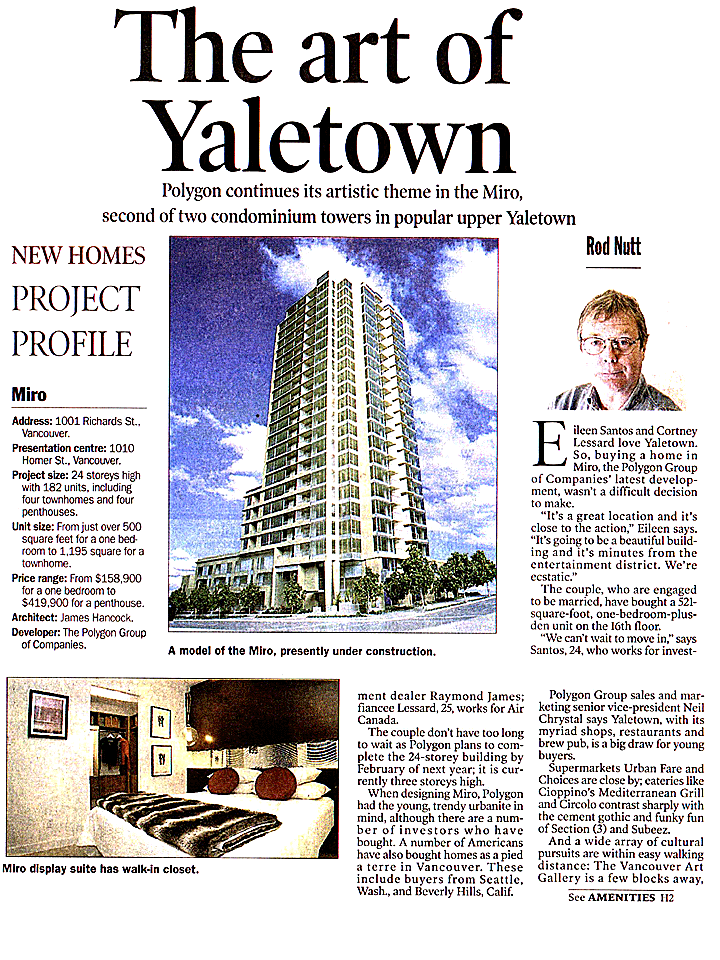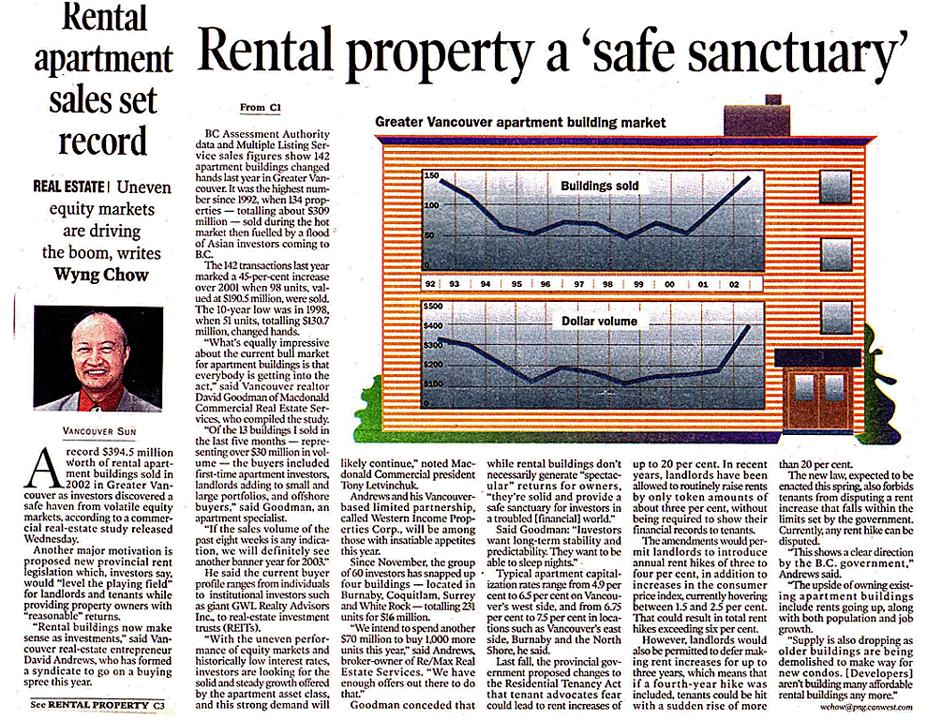Repair costs to subsidized units could exceed $100 million: CEO
William Boei
Sun

CREDIT: Bill Keay, Vancouver Sun Subsidized housing complex run by the Hungarian Society, funded and overseen by BC Housing.
A provincial Crown corporation has launched dozens of lawsuits against the building industry over leaky subsidized-housing complexes in the Lower Mainland and on Vancouver Island.
BC Housing is still assessing the damage but fears that more than 250 buildings with 10,000-plus units have suffered “building envelope failure,” chief executive officer Shayne Ramsay said in an interview.
The buildings are owned by non-profit societies, but were built with government funding and operate on BC Housing budgets. Residents pay a set portion of their income as rent.
The damage is expected to run to at least $100 million, but neither the non-profit societies nor their tenants will be stuck with the bills. BC Housing is taking care of the repairs and trying to recover its costs by suing the builders, architects, sub-contractors and others.
Municipal governments, which are often named in leaky-condo suits for failing to enforce building bylaws, are not being sued, Ramsay said, because taxpayers are already on the hook for the bills.
The government is also paying for $100 million or more in repairs for 300 leaky primary schools in coastal B.C. and suing the building industry to recover those costs.
The lawsuits are upsetting both leaky-condo owners and the construction industry, but for different reasons.
Some of the owners of 65,000 or more leaky condos, with an estimated $1.5 billion in water damage, say it’s unfair that they are stuck with complex and expensive damage assessments, repairs and lawsuits while some classes of leaky-building owners are looked after by the government.
“They’ve left the owners of leaky, rotten condos to flounder,” said James Balderson of the Coalition of Leaky Condo Owners .
Balderson said many leaky-condo suits have been abandoned by strata corporations because the owners don’t have the expertise or the money to keep going.
But Housing Minister George Abbott said the government is protecting public investments by taking charge of subsidized housing and school building problems.
“We have an obligation to try to protect the interest of the taxpayer, and that’s what we’re attempting to do,” Abbott said Friday.
He dismissed a suggestion — first made by the Barrett Commission on leaky condos and supported by advocacy groups — that the government should pay for leaky-condo repairs and handle the lawsuits because it can do the job far more effectively than hundreds of individual strata councils.
“The notion of the Crown proceeding on behalf of … private interests is a difficult one, and obviously is fraught with difficult precedents,” Abbott said.
BC Housing has filed between 50 and 60 lawsuits so far against builders, architects, engineers, contractors and other members of the building industry.
Ramsay said all the faulty subsidized-housing buildings date from 1983 to 1997. They suffer from “virtually the same” ailments as leaky condos — they let wind-driven rain in but won’t let it out again, resulting in rot in the wood-frame walls.
“It was a systemic failure in the private market, it was a systemic failure here,” Ramsay said. “There are design issues, there are construction issues, there are material issues. Maintenance in some cases may be a contributing factor as well. It’s about the same basket of causes that you’ve seen across the industry.”
But construction industry officials are grumbling that government law suits will drive its insurance premiums, bonding and other costs through the roof, and there is talk of refusing to negotiate settlements and mounting a test case to argue that a government-imposed building code — not faulty design or construction — is at the root of leaky-building problems.
“I strongly believe that [the code] is the underlying cause,” Gauvin 2000 Construction president Mark Gauvin said in an interview, “and that’s why we’re seeing rot in walls not only in condominiums, but single-family, commercial, institutional, all types of construction.”
Gauvin told a recent Vancouver Regional Construction Association seminar that building walls have always leaked, but that code changes in the 1980s, intended to conserve energy by making walls airtight, made it impossible for them to dry once they got wet.
Ramsay rejected that argument, noting that the building code demands that walls must be built so that if water gets in, it must be able to get out again.
Gauvin said the building industry potentially faces hundreds of government lawsuits — more than 450 in Greater Vancouver alone — and should be fighting back.
“Pick one case and defend it properly,” he told the seminar. “Do the research, hire the building scientists, investigate older buildings, and understand that this whole industry did not suddenly start doing everything wrong because of greed or incompetence.”
Gauvin added: “I don’t believe that contractors, or even architects, are the guilty parties in the whole leaky-condo, school and high-rise nightmare. … Building code changes were imposed on the industry without adequate research.”
Construction association president Keith Sashaw said the government lawsuits “are going to have a pretty profound impact on the industry in terms of its ability to get insurance and bonding, and continue to do work.”
Sashaw said talks have begun among building industry officials, insurance companies and others that might lead to a proposal to the government “to make some changes” on behalf of the building industry.
“I think that would be the preferred option, rather than getting into lengthy and acrimonious legal battles,” he said.
BC Housing said 166 subsidized-housing buildings in the Lower Mainland and 88 on Vancouver Island are likely “subject to some form of building envelope problems.”
The 254 buildings average 40 to 50 units each, which means between 10,000 and 12,000 units are affected.
Fifty of the most damaged Lower Mainland buildings have either been repaired or are undergoing repairs, and another 62 buildings that need fixing are going through detailed assessments. Repairs to the most seriously damaged buildings are expected to be finished by 2005-2006.
Ramsay acknowledged that the $100-million repair estimate could rise.
“You really don’t know the true picture until the siding or the stucco comes off,” he said, agreeing that initial repair estimates often rise as problems are uncovered, but seldom go down.
None of BC Housing’s suits have come to trial or been settled. Ramsay said the Crown agency is not necessarily looking for a test case and is open to “creative and innovative ways to resolve these [suits] outside of litigation.”
BC Housing has created an internal “building envelope repair group” with five or six full-time staff to oversee building assessments and repairs, he said. The agency also hires technical experts and outside lawyers to press its lawsuits.
Balderson said leaky-condo owners are still looking for more financial help from the provincial government, which already provides interest-free repair loans and forgives provincial sales tax on building materials.
Only 20 to 25 per cent of condo owners qualify for those programs, Balderson said, calling on Premier Gordon Campbell to fulfil the second half a promise he made in the 2001 throne speech — to obtain federal funding for a second Vancouver convention centre, and for “a fair program of relief for owners of leaky condos.”
Abbott, who first asked Ottawa for more leaky-condo aid in 2001, said he’s still trying and hopes to lobby federal officials again at a federal-provincial housing meeting in April.
© Copyright 2003 Vancouver Sun





